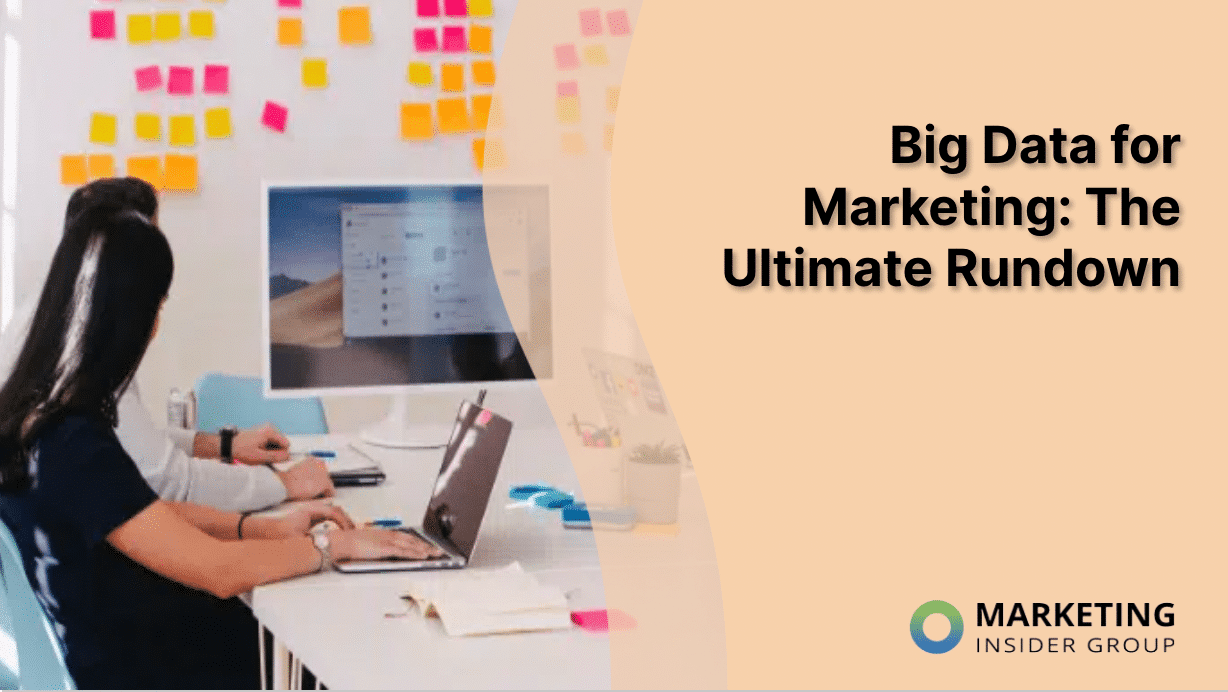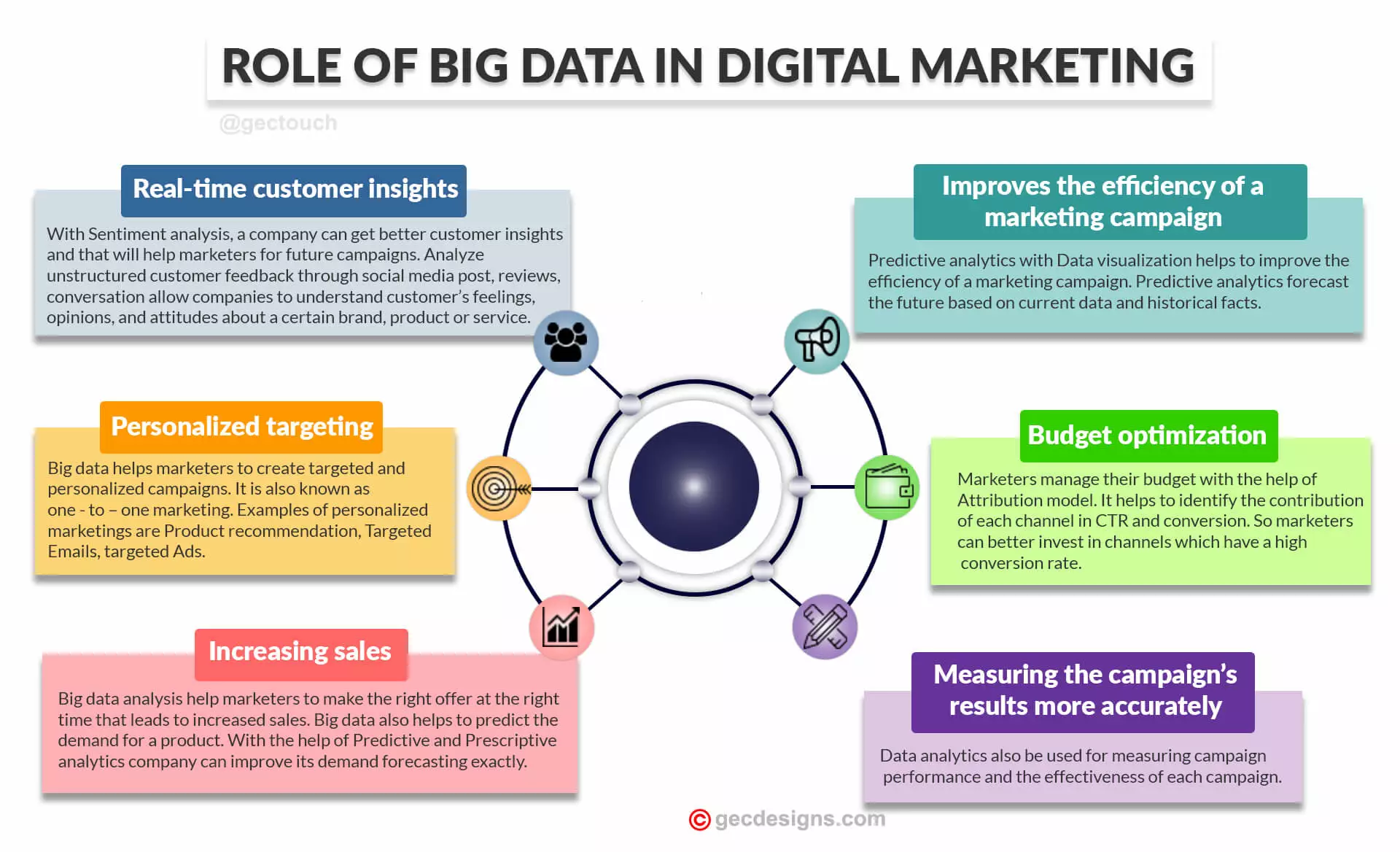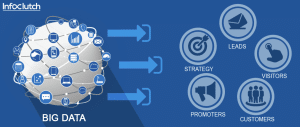
Big Data For Marketing: The Ultimate Rundown
The opportunity in Big Data for marketing lies in how to better reach customers with your messages in a way that gets them to act.
But, it is challenging to really grasp how to best use your data and convert it into results.
Big Data for Marketing is easy to say but hard to do. How do you convert big data into into real business insights that drive real business value? Read below to find out.
Quick Takeaways:
- Big Data in marketing involves collecting, analyzing, and utilizing large and complex datasets to inform marketing strategies and decision-making.
- Leveraging Big Data in marketing offers benefits such as enhanced customer understanding, marketing optimization, and data-driven innovation
- Overcoming challenges and effectively translating insights into action is key to realizing Big Data benefits.
- Insight-based experimentation and adaptation make for an ever-improving marketing strategy and customer experience
What is Big Data?
The definition of “Big Data” does not come as a shock, it is simply data that is larger and more complex that comes in at a greater velocity from many different sources.
In the marketing world, big data refers to the collection, storage, and analysis of large volumes of complex and diverse data sets, with the aim of gaining valuable insights to inform marketing strategies and decision-making.
By analyzing big data, marketers can uncover patterns, trends, and correlations that help them understand customer preferences, identify market segments, optimize advertising campaigns, personalize messaging, and improve overall marketing effectiveness.
Marketing experts have likened Big Data marketing to “gold mining” in the sense that it is not about knowing where the gold is, but how to get it out and turn it into something useful.
Image Source: Mango Macro and Crypto
The 3 V’s
Many marketing experts point to three key elements of Big Data in regard to marketing. These three components come together to produce the most effective processing strategy for Big Data in Marketing.
- Volume- amount of data
- Velocity- speed of data generation
- Variety- diversity in type of data collected
Sometimes, a bonus “V” is included in the list, veracity, or the quality of data you produce can be the difference between optimizing your data or becoming lost in the endless analytics… More on that later on.
Types of Big Data
In the realm of marketing, big data encompasses diverse sets of information that can be categorized into various types. The three types of big data that hold significance in the marketing sphere are customer data, operational data, and financial data.
- Customer: information related to demographics, behaviors, preferences, interactions, and purchase history
- Operational: data related to sales, inventory, supply chain, logistics, customer service, etc.
- Financial: includes data on revenue, expenses, profitability, budgets, and financial performance
All three types of data hold great significance in data processes. Consumer data enables the development of effective strategies, operational aids in optimization, and financial can be leveraged to understand financial impacts of marketing decisions.
Endless Big Data Benefits
Big data has revolutionized the way businesses approach marketing, offering a wealth of opportunities and advantages that were previously unimaginable. Here are some of the key benefits that big data brings to the world of marketing:
Customer insights and understanding: Utilizing Big Data to better understand your audience and customer base will tell you what your viewers are looking for. You can transform this new comprehension of your consumer into specialized content and an overall better experience for them.
Customer experience: Big data enables businesses to create seamless and enjoyable customer journeys, resulting in increased customer satisfaction, loyalty, and advocacy.
Effective Predictions: Analyzing historical data and patterns helps businesses develop predictive models that anticipate customer behavior and market trends.
Marketing Optimization: With a data-driven approach, businesses can identify the most effective channels, messages, and timing for their campaigns. By measuring and analyzing campaign performance in real-time, marketers can make data-backed adjustments, refine targeting strategies, and allocate resources more effectively.
Embracing big data in marketing can unlock valuable insights and pave the way for innovation, efficiency, and customer-centricity, ultimately helping businesses achieve their marketing goals and gain a competitive edge.
Potential Challenges
Leveraging big data in marketing offers immense potential for driving business growth and enhancing customer experiences. However, there are several challenges that marketers face when dealing with big data. Here are some issues you might run into:
- Time Disparities in Data Systems: A delay in incoming data can create a disconnect in the information they are receiving and actual customer preferences.
- Streaming Data Sources: Data can be vast and arrive at high velocities, making it difficult to process and extract insights promptly.
- Cross Department Cooperation: Lack of cross-functional collaboration within a company can hinder the seamless integration and sharing of data.
- What data to Gather: It’s important to prioritize quality over quantity and focus on collecting relevant and meaningful data that aligns with marketing objectives.
- Which Analytics to Use: From descriptive analytics to predictive modeling and machine learning algorithms, choosing the right analytics approach requires careful consideration.
- How to Go from Insights to Impact: The biggest Big Data challenge lies in translating collected insights into actionable strategies that drive meaningful impact.
While big data presents numerous opportunities for marketers, it also comes with its fair share of challenges… with careful consideration, strategic planning, and a collaborative mindset, organizations can leverage big data to gain a competitive edge and deliver exceptional customer experiences.
Big Data Marketing is All About Questions
The first step in effective Big Data Marketing is understanding the questions that customers are asking when they do a Google search, visit a website or participate in a social media conversation.
Use their questions to shape your goals and strategy. Then, ask some more internal questions…
- How did the last campaign perform?
- Which keywords drive conversions?
- What websites did my prospects visit before they came to my sites?
- What was the unsubscribe rate from that new campaign?
- Is Twitter sentiment for our brand trending up or down?
- How many unique visitors came to our site today? Where did they come from?
All these questions should lead to an endless process of experimentation within your strategy. Use the answers to all your questions to adjust and adapt to create a constantly improving customer experience.
4-Step Plan to Big Data Marketing Insights
- Define your customers’ top keywords and topics through search analysis. Starting with a simple look at Google Trends.
- Social analytics to show what % of social conversations include mention of your brand. This is where the data gets really big.
- Insights from your Website analytics will help you understand which keywords and referring domains drive conversions.
- Finally, combine these 3 massive big data sets to help to make decisions on marketing plans, tactics and budget.
From gaining a deep understanding of customers to optimizing campaigns, predicting customer behavior, and delivering personalized experiences, big data empowers marketers to make data-driven decisions that drive success in today’s highly competitive marketplace.
Embracing big data in marketing can unlock valuable insights and pave the way for innovation, efficiency, and customer-centricity, ultimately helping businesses achieve their marketing goals.

Image Source: Infoclutch
What Marketers Are Saying About Big Data
Here is a curation of thoughts from folks I follow. You should also let us know what you think in the comments below.
Steve Peck:
“I believe big data will continue to be talked about and properly utilized by the top 1% of savvy marketers, but for the mainstream marketer, it will continue to be like the mystic marketing leprechaun. In other words, something they will continue to search for and talk about in group settings in hopes of scoring a higher ROI and pot of gold, but have no clue how to actually find, capture or put ‘big data’ to work when they return to their cubical. Not until larger numbers of innovative companies develop turnkey ways to generate easy to understand and actionable insights from big data will it become ‘the year of big data’.
I believe that marketers in 2014 will continue to make inroads to get closer to capturing the big data ‘leprechaun’. Instead, the year will pick up where 2013 left off with continued focus on the needs and wants of the individual reader, and a focus on understanding what qualified customers are most interested in, so that sales and marketing professionals can automate delivery of that relevant content, or product specific information, based on where that prospect is in the buying cycle.”
Eric Wittlake:
“While I generally agree with Steve’s premise, I think we can consider big data in marketing more broadly as well (strange to say, as it isn’t particularly well defined for many marketers either).
Consider the algorithmic learning and optimization a DSP does across billions of impressions with 100’s of data points per impression, all for a single marketer. While it may be a limited application, it is something many marketers are embracing (with mixed results I’ll add, but that isn’t a fault of the premise of big data).
Social media is another space where some of the ideas of big data are being applied, and marketers are making use of them. A question marketers are starting to use this information to answer: What types of conversations are predictive of someone in market? Others are using it to identify emerging trends, like watching for words paired with their brand or category name and identifying emerging pairing and those that are trending up or down (simplified example of far cooler things real data geeks can do with this data).
When we look at it this way, marketers may not be sophisticated yet, but many of the tools they are using are giving them some of the benefits of big data today. Now, instead of pursuing big shiny data infrastructures and software, they need to pursue information or insight they can’t get today using these existing solutions. When that leads to their own big data toolsets, it will be because they really have an application for it.”
Howie Goldfarb:
“Businesses have crunched data forever. I remember in the mid-90’s and I was trained as an ISO9001 auditor and my employer used constant improvement metrics. Our vendors were moving to SAP which was/is a big data platform especially for procurement chains. Then in the mid-2000’s my new employer was using lean manufacturing and working on Six Sigma. Sales has always used Big Data. Marketing too. Just now the tools are less expensive, and data is more widely available to the average person. Google Analytics is Big Data.
So I feel marketing needs to stop with the hype of jargon and focus on the nuts and bolts. We should be talking about how small businesses with limited resources can now have data tools available that previously they had to pay for from the likes of Oracle, SAP, Vocus, etc. I mine data from the media. I crunch numbers with my finance background daily. The key is training people who to look for the data and use it. Marketers tend to pick and choose what data they use (subjective). For example, the average Facebook user engages with each brand page they LIKE less than 1x per year. I didn’t need a database to find that data just math.”
Doug Strickland:
“While the idea of real-time dashboards are very cool indeed, there are a couple of problems with their execution.
First, social marketing dashboards aren’t like automobile dashboards. Better said, we aren’t as good at driving the insights bus as we are the family van. Having data in front of you doesn’t – real time or not – provide the insights and analysis that comes from a little ‘soak’ time. We will get better at understanding the dials and indicators over time, but right now it’s shiny buttons and flying lights and most analysts struggle at differentiating the speedometer from the tach.
Add to that the service layer – or perhaps subtract. We have a lot of trouble getting real or near-real-time data from the currently available constantly changing API’S.
Our organization is working on surfacing the “meaning” more than just the data. Just like there are narrative character archetypes in literature, there are patterns in social behavior that are discernible, measurable, and can be recognized best through automated systems.
While most fumble with keywords and topics, imagine if the dashboard told You what was important by recognizing shifts in topical points of focus, meme transitions and evolutions, inflection point patterns, etc.
When dashboards can teach us to fish…”
Contact us to take advantage of our content builder services. We generate millions of views monthly, and we’ll make sure you get full value out of decision intelligence tools for marketing.







Good article and references Michael. Definitely heavy indeed. From a philosophical standpoint, I view Big Data giving us a window into “how” behavior. Whereas I also believe Big Data needs to be complemented by qualitative understanding of “why” behavior to get true insight and foresight about customers/buyers. Now that could be another heavy discussion 🙂
Tony
Michael, I’m doing some poking around about the intersection of big data and real-time marketing and this post was helpful. Thank you
Thanks David, I’d be happy to collaborate at any time if you like!?
Great point Tony! I was selling “the why behind the buy” data early on in my career but then it was more of a dream vs a reality.
“Big data means you understand your customers’ questions” Yes! If you don’t understand your customers’ questions, how on earth are you providing value to them?
Thanks Pauline, I think most are missing this key step!
Michael, When I read your thread on Big Data I’m mostly hearing Small Data — unsubscribe rates, sentiment and even brand monitoring are small subjects in the Big Data pool. We’ve been developing tools and methodologies for marketers to access and analyze big data. In the process we discovered that big data analysis is very good at unearthing risk (which is the same as opportunity). This led us to seeing Marketing as a risk management function. Done well, Big data analysis tells companies that unsubscribe rates will fall next quarter, sentiment is about to turn positive or your brand will be seen as less relevant over in the next 18 months.
Jon Baron is right about the insights being more critical than analysis. Insights come from asking the right question — but it’s not the customer’s questions that matter. There is a common experience or “glue” that binds communities together. Asking questions about the binding reveals more insights about risk and opportunity.
Hi Russ, so you’re adding the whole Predictive element here which I completely agree is critical. You are also right on about most (not all) of the data referred to as small data. But I can’t agree that the customer questions don’t matter.
Every businesses’ pure existence relies on anticipating and solving those core customer questions. The business that has yet to identify which questions their customers are asking are flying blind and speaking only or mainly to themselves.
I’m not suggesting that this is all a successful Big Data Marketer should do. The themes you mention are important to protecting and growing the business. But it’s the understanding of the combination of customer and business questions and predicting outcomes that will drive success IMHO.
Hi Michael,
Great article and I especially liked your four step plan. I have developed something similar regarding big data and CRM and I also developed four different steps in how the future of CRM is impacted by big data: https://bit.ly/14xu0qU
Thanks Mark, I appreciate you sharing this with us!
Russ – I think you are making an important distinction. Big Data is definitely not synonymous with basic marketing analytics. I think you are 100% right that there needs to be an algorithmically-based element of prediction to count as big data. Thanks for that insight.
“You Keep Using That Word, I Do Not Think It Means What You Think It Means”
Love that quote Jon. One of my faves! Thanks for weighing in!
Thanks Michael, very insightful. I think that big data is a real challenge to marketers and that it needs to become simpler to use before we see mass adoption.
Thanks Ariel, i’m hearing a lot of people talk about the little data (insights) that are what we really need but to me, it still begins with asking the right questions